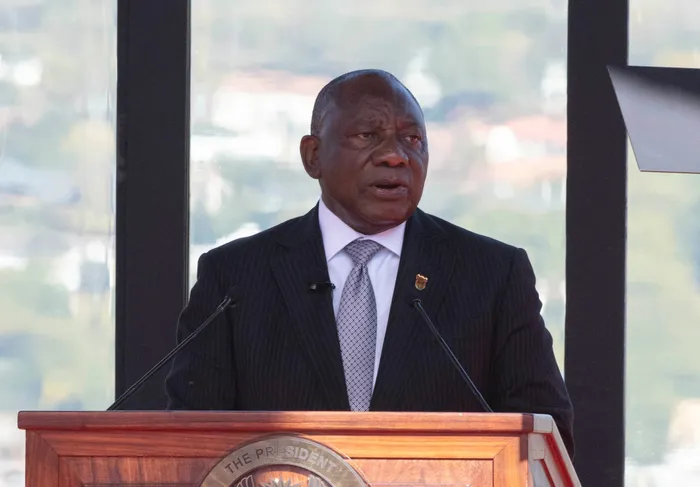GNU must prioritise climate action to strengthen our global competitiveness

President Cyril Ramaphosa recently delivered his inauguration address at the Union Buildings in Pretoria. What also remains to be seen is whether climate action will take centre stage in the seventh administration as led by Ramaphosa, who is also chairperson of the Presidential Climate Commission, says the author. Photo: GCIS
By Blessing Manale
In the lead-up to the elections, most political parties tabled their manifestos, with many analysts, lobbyists, interest groups and investors among others dissecting such electoral promises to find and establish resonance with their favourite policy or implementation proclamations with whoever stood a chance of a victorious electoral outcome.
Many of those manifestos fell short of the obvious indications on climate policy, simply because climate change could never be campaign fodder in such a uniquely hotly contested election in our country.
The elections have come and gone, and we are yet to install a fully-fledged government of a unique nature in the form of a multiparty coalition Government of National Unity (GNU).
What also remains to be seen is whether climate action will take centre stage in the seventh administration as led by President Cyril Ramaphosa, who is also chairperson of the Presidential Climate Commission.
That said, one needs to find comfort in Ramaphosa’s inauguration speech last week when he highlighted several priorities for this new government, one of which was his commitment to accelerating the response to tackling climate change.
The president has said that the government will not rest in addressing the climate crisis, and has vowed to tackle these challenges in a manner that is ambitious, just, and inclusive – not only for this generation, but also those that follow.
In preparation for the seventh administration, the Presidential Climate Commission has undertaken a comprehensive assessment of the state of climate action in South Africa. The report fulfils part of the commission’s mandate, which is to track progress on climate change and the just transition and provide advice where course corrections may be needed.
The report recently approved by the commission and about to be handed to the president and his Cabinet in a few days covers major economic sectors in the country – water, agriculture, energy, and transport – and highlights the changes required to get on track to meet our aspirations of the 2030 target set out in our nationally determined contribution (NDC).
The race to build climate resilience
It is also envisaged that the report will also serve as our contribution to the mooted National Dialogue, and we believe the seventh administration will find the assessment and recommendations useful as it gears up for the important national development challenges it must address.
The implementation of these commitments has, however, been sluggish in the past; for example, only 28 of the 95 actions outlined by the National Climate Change Adaptation Strategy are listed as fully implemented or currently being implemented.
Prioritise addressing emissions reduction commitments
South Africa is currently the 14th largest greenhouse gas (GHG) emitter in the world, and the largest emitter on the African continent, with the production of coal-based electricity being the largest contributor to South Africa’s emissions, accounting for more than half of the country’s emissions.
South Africa has severe electricity security challenges, with increased load shedding causing significant social and economic impacts. We still face the need of decarbonising South Africa’s coal-based energy system, reducing the country’s emissions and improving air quality, yet with the serious livelihoods ramifications for the estimated 150 0000 to 200 000 workers in the coal value chain requiring a just and professionally managed transition.
Though not in a comfort zone, we are also still on track to meet its 2025 GHG emissions target with current policies, but will need to implement more ambitious actions, particularly in the electricity and transport sectors if it is to reach the 2030 GHG emissions target.
These ambitious actions will require the full implementation of the 2019 Integrated Resource Plan with its prescribed electricity build plan and decommissioning plan, and unpacking the recently announced delay in the decommissioning of Eskom’s Hendrina, Camden, and Grootvlei coal-fired power plants and implications for the targets.
Decarbonised transport is long overdue
Energy has attracted the focus on emissions reductions, but transport should be next priority, and we are behind the curve, noting the considerable role it plays in South Africa’s economy, which could be undermined by climate change and shifting policies at home and abroad.
In our report, key shifts would include increasing collective and shared transit modes and decarbonising carbon-intensive modes of transport by adopting new energy vehicles (NEVs). But all in all, to transition to more climate action-oriented transport policy and early investment in public road transport vehicles, increase share of NEVs in light-duty vehicle as well as increasing the number of public charging stations, powered by renewable energy.
As we await the ushering in of the seventh administration, we can only echo the calls for urgent measures to reduce emissions and improve resilience, if we are to advance into a low-carbon economy and strengthen our global competitiveness while addressing the triple challenges of poverty, inequality, and unemployment.

Blessing Manale is the head of Communications and Outreach at the Presidential Climate Commission.
BUSINESS REPORT